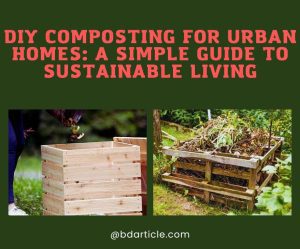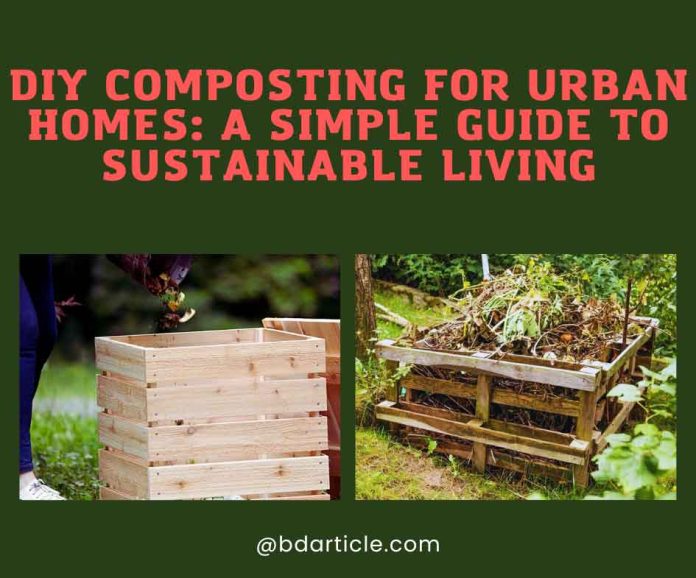Urban living can often present challenges when it comes to adopting environmentally friendly practices. Limited space and lack of gardens might discourage people from thinking about composting. However, DIY composting for urban homes is not only feasible but can also become an incredibly rewarding and sustainable practice. Composting at home not only reduces the waste sent to landfills but also helps create nutrient-rich soil for your plants, contributing to a healthier urban environment.

Why DIY Composting for Urban Homes is Essential
Composting is the natural process of recycling organic waste, like fruit scraps, vegetable peels, coffee grounds, and garden trimmings, into nutrient-rich soil. For urban dwellers, composting offers an opportunity to participate in sustainability initiatives without needing a large backyard or garden space. It’s an excellent way to reduce waste while also benefiting the plants in your home or small balcony garden.
As cities grow, the strain on landfills becomes a pressing issue. A significant portion of landfill waste is made up of organic materials like food scraps and yard waste, which, when composted, can easily be diverted away from the waste stream. By practicing DIY composting for urban homes, you’re taking a step toward reducing your carbon footprint and contributing to a greener future.
Getting Started with DIY Composting in Your Urban Home
Setting up a DIY composting system in an urban home is surprisingly easy. Here’s a step-by-step guide to help you get started:
-
Choose the Right Composting System
Before starting, you’ll need to decide which composting system works best for your space. For apartments or homes with limited space, consider these options:
- Vermicomposting: This method uses worms to break down organic material and is ideal for small spaces. You can easily set up a worm bin that can be kept in a closet or under the kitchen sink.
- Bokashi Composting: This fermentation-based method doesn’t require oxygen and is perfect for compact living spaces. It works quickly and can compost meat, dairy, and other kitchen scraps that traditional composting systems cannot.
- Aerobic Composting: If you have a balcony or backyard, a simple compost bin or pile can be ideal. This method requires regular turning to provide oxygen to the decomposing materials.
-
Select the Right Location
The location of your compost bin is crucial. Choose a spot that’s easily accessible but out of the way to avoid odors or attracting pests. A balcony, kitchen corner, or storage space in your home can work well.
-
Gather the Right Materials
Composting requires a balance of ‘greens’ (nitrogen-rich materials) and ‘browns’ (carbon-rich materials). Here’s what you can compost:
- Greens: Fruit and vegetable scraps, coffee grounds, tea bags, grass clippings, and green leaves.
- Browns: Dry leaves, shredded newspaper, cardboard, sawdust, and straw.
Avoid composting meat, dairy, and fatty foods in traditional composting systems, as they can attract pests and cause unpleasant odors. However, systems like Bokashi can handle these materials.
-
Maintain Your Compost
Once you’ve set up your compost bin, regular maintenance is key to a successful composting process. Turn your compost regularly (if using an aerobic method) to ensure it gets enough oxygen. Keep the compost moist but not soggy, as moisture helps with decomposition.
-
Harvest Your Compost
Depending on the method and materials used, it can take anywhere from a few weeks to a few months for your compost to fully break down. The result will be dark, crumbly, and nutrient-rich compost ready to use in your plants or garden. It’s a great way to nourish your urban garden or plants and reduce your reliance on store-bought fertilizers.
The Benefits of DIY Composting for Urban Homes
- Reduces Waste: By composting at home, you significantly reduce the amount of organic waste that ends up in landfills, which helps reduce greenhouse gas emissions.
- Improves Soil Health: The compost produced from your organic waste is rich in nutrients that can improve soil quality. This is especially beneficial for container gardening and growing plants in urban spaces.
- Saves Money: By composting, you reduce the need to buy store-bought fertilizers, soil conditioners, or other plant care products, which can be costly.
- Supports Sustainable Living: Composting is an essential practice in building a sustainable lifestyle. It reduces the strain on landfills, helps conserve natural resources, and contributes to a cleaner urban environment.
- Educational Value: DIY composting for urban homes provides an excellent opportunity to learn about waste management, sustainability, and the environment. It also serves as an educational tool for children and adults alike to become more mindful of the food waste they generate.
Tips for Maximizing Your Composting Efforts
- Avoid Overloading Your Bin: Adding too much food waste at once can make it harder for the composting process to occur efficiently. Try to add materials in layers to promote balanced decomposition.
- Use a Compost Aerator: A compost aerator helps mix the contents of your compost bin more effectively, speeding up the decomposition process and preventing bad odors.
- Be Patient: Composting takes time, so don’t rush the process. Keep turning your compost, maintain the right balance of green and brown materials, and let nature do its job.
- Consider Mind Mapping Techniques for Students to Boost Learning and Creativity: Composting can also be a great project for students to understand biological processes, recycling, and sustainability. Mind mapping techniques can make the process more visual and engaging, helping kids and adults organize ideas on how to manage composting in small spaces.
Overcoming Challenges in Urban Composting
One common challenge in urban composting is odor. This can usually be avoided by balancing the ratio of greens and browns in your compost, ensuring proper aeration, and monitoring moisture levels. If you choose a Bokashi or vermicomposting system, these problems are less likely to occur. Another challenge is pest management. Ensuring your compost bin is sealed properly and using composting systems like vermiculture or Bokashi can help minimize the risk of attracting rodents or insects.
Visit Zero Waste Home or Composting Council for more tips on starting a composting system in your urban home.
Conclusion
DIY composting for urban homes is a rewarding and environmentally friendly practice that anyone can adopt. By following simple steps, urban dwellers can contribute to sustainability while improving their home environment. It’s time to take control of your waste and turn it into something beneficial. Start composting today, and help create a cleaner, greener world for tomorrow.
# DIY_Composting #Urban_Homes #SustainableLiving

